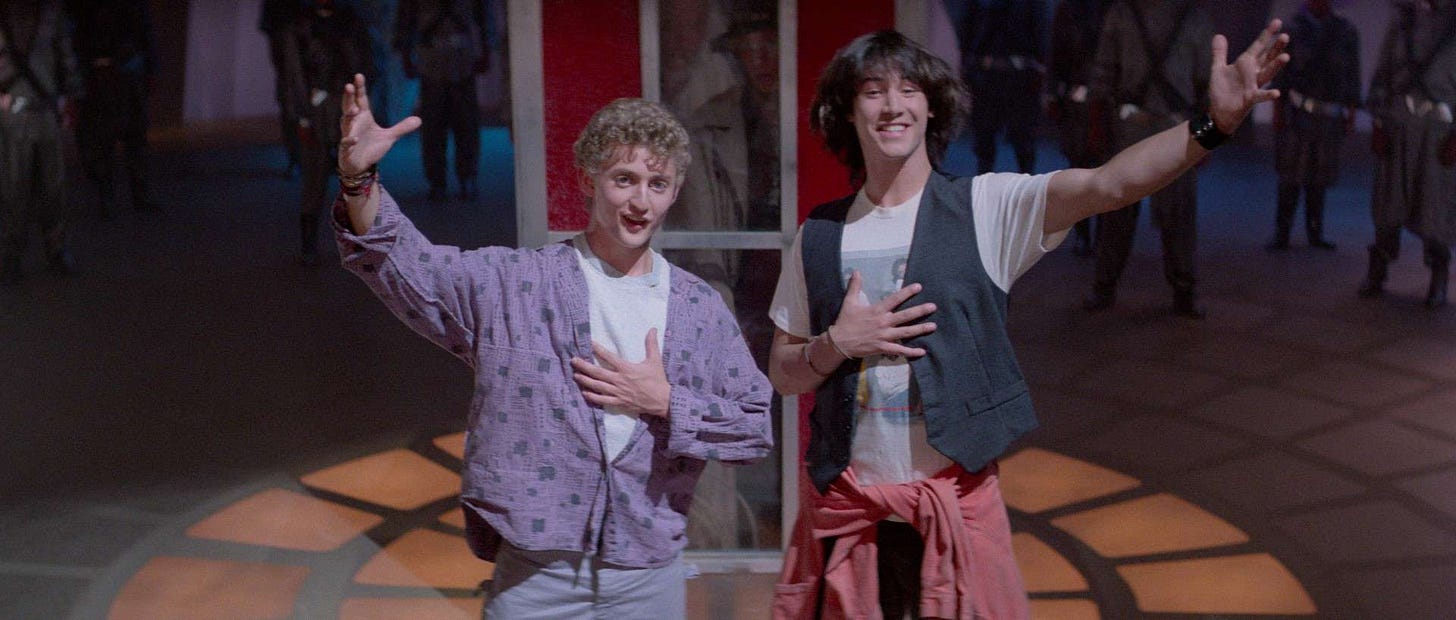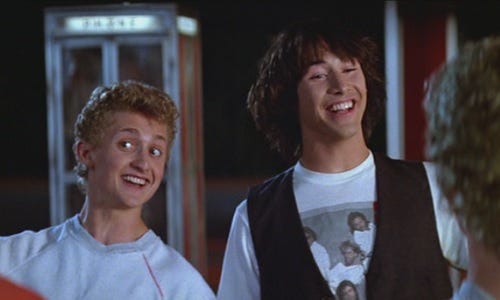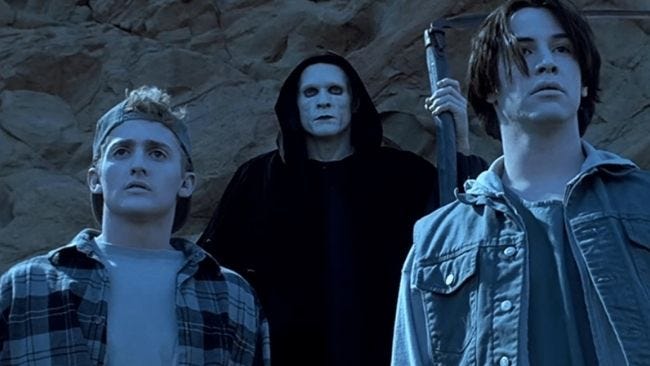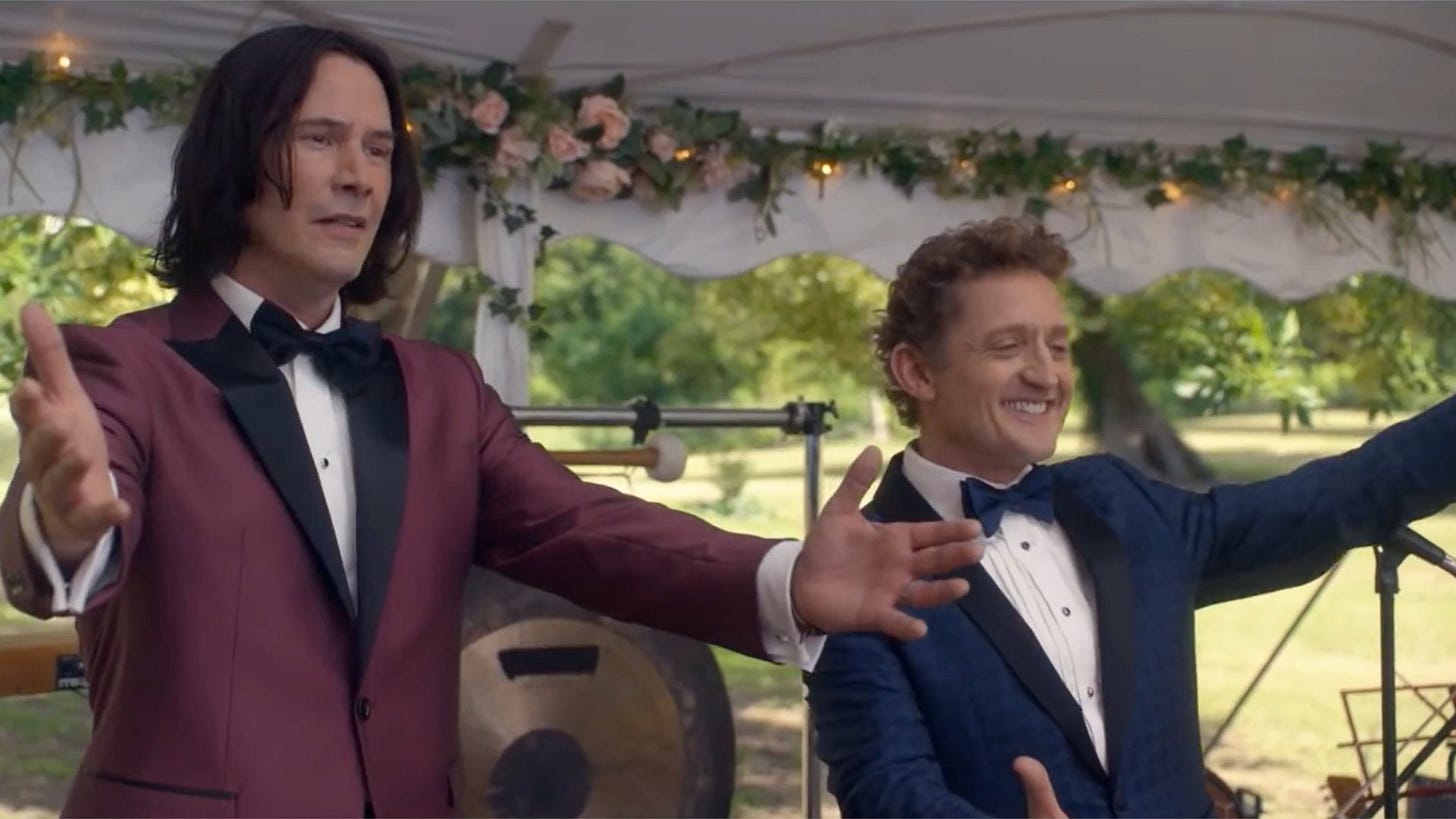Is there a more unlikely trilogy than the adventures of Bill S. Preston, Esq. and Ted “Theodore” Logan?
When it was released in February 1989, Bill and Ted’s Excellent Adventure seemed to be just another lark for teenagers, a silly stoner-esque comedy that might distract young viewers at the mall’s multiplex. It was, instead, a surprise hit, bringing in $40 million on a budget of just a quarter of that. It was followed by a sequel two years later and remembered fondly by Gen Xers before receiving a surprising legacy sequel in 2021.
These days, Keanu Reeves is better-known as stoic assassin and all-around badass, and Alex Winter is a successful producer. But in honor of the duo’s anniversary, let’s take a look at the franchise and see if it still holds up. Feel free to share and comment, but remember: be excellent to each other.
Dealing with the oddity of time travel with the greatest of ease
I have a vivid memory of the first time I saw Bill and Ted’s Excellent Adventure. I was 10 years old and it was New Year’s Eve 1989. My family was having a game night and to cap it off, my dad rented the movie. I saw my mom roll her eyes, and he deflected with a “it’s for the kids” shrug. It wasn’t long before all of us were laughing.
And that’s probably the best review I can give of the first Bill and Ted film.
Bill and Ted’s Excellent Adventure is a piffle, and it was designed as such. Stephen Herek — who went on to direct The Mighty Ducks and Mr. Holland’s Opus — is well aware that this is a lark, and he directs it with a breezy lack of pretension. It moves at a fast clip, with an episodic nature that allows his two heroes to waltz through time, hoping to nab historical figures for their final school project, without much consequence or incident. Aside from a skirmish in medieval England and a saloon brawl in the Old West, Bill and Ted just land their phone booth in a certain time and place, grab a historical figure, and then move on to the next era. The chuckles come from watching these two slackers interact with some of the most identifiable figures of history, including Socrates, Billy the Kid, Abraham Lincoln and Joan of Arc (who they discover is not Noah’s wife). The brief presence of George Carlin as the duo’s future mentor Rufus gives it a twinge of credibility.
Winter and Reeves find just the right notes to Bill and Ted. Contrary to much pop culture, the two are not stoners; they might have the spacey speech and vacant look in their eyes, but we never see them toke up or hear them mention it. That gives them an endearing innocence; they come by their stupidity honestly. And I use the word “stupid” intentionally. Bill and Ted are not dumb; they manage to think their way through scenarios. They’re not idiots and, most crucially, they’re not cruel. They just don’t have book smarts.
It’s that innocent charm that makes them such compelling characters. They’re two best friends, and the affection between Winter and Reeves feels authentic. They’re also guided by an ethos we don’t see much in movies these days. Bill and Ted don’t want fame, power or babes (although those things might be nice). Their guiding ethos is simply “be excellent to each other” and “party on dudes.” We’ve done a lot worse than two heroes who want us to treat each other kindly and enjoy life.
The script never looks down at its main characters. Screenwriters Ed Solomon and Chris Matheson have a great deal of love for the duo — they should; after all, they created them in a standup routine years earlier. They anchor the script by making it about their friendship; Bill and Ted aren’t aware their music will change the world, but they are aware that failing their history class means the end of their friendship, since Ted will be shipped off to military school. Solomon and Matheson are also clever writers, and the dialogue is one of the film’s strongest asset, as many of the biggest laughs come from giving the characters phrases to say that there’s no way they understand — my personal favorites are the immortal “strange things are afoot at the Circle K” or Bill telling Billy the Kid, “You are dealing with the oddity of time travel with the greatest of ease.”
The enthusiasm and carefree attitude helps paper over the film’s rougher moments, which basically occur any time Winter and Reeves are offscreen. A subplot of Napoleon’s adventures with Ted’s younger brother is amusing in theory but usually just sits there (although Napoleon’s escape to a waterpark is a lot of fun to watch). And while a digression about Bill’s dad marrying a woman just a few years older than Bill is funny, the tread of Ted’s father threatening to send him to Alaska feels like an obligatory obstacle and never receives much of a resolution. And there’s one egregious use of a slur that dates the film and puts a brief acidic taste into an otherwise welcoming and fun film (this same slur re-appears twice in the sequel).
Giving Death a Melvin
Bill and Ted’s Excellent Adventure was an out-of-nowhere hit that also gained solid critical notices, so it was perhaps inevitable that they would return in a sequel; after all, they were still pretty poor musicians at the end of the first film. But after you’ve sent Bill and Ted through time, where else can they go?
The answer: to Hell.
Bill and Ted’s Bogus Journey pits the most iconic duo against a terrorist from the future, who sends robots that look just like them into the past to kill them, take over their lives and ruin the Battle of the Bands. The Wyld Stallyns must travel through hell, defeat the Grim Reaper at board games, approach God to ask for help and then trust a mysterious alien to build good robot versions so they can save the princesses and win the competition.
Even by Bill and Ted standards, this is a weird movie.
Director Peter Hewitt takes over for Herek, and he brings a much more ambitious, cinematic eye. Visually, this is probably more striking than a Bill and Ted movie should be. The film’s version of hell is legitimately scary, both in its traditional fire-and-brimstone version and the surreal personal hells Bill and Ted find themselves in. Hewitt riffs The Seventh Seal in a scene where Bill and Ted challenge the Reaper to Battleship, Monopoly, Clue and Twister (William Sadler steals this film). There’s a blatant shoutout to the classic Star Trek episode “Arena,” and a clever homage to the Michael Powell, David Niven film A Matter of Life and Death when the two get to Heaven. You wouldn’t think this would be a film full of homages to classic cinema, but here we are.
I assume Winter and Reeves wanted to prove that they could play more than affably doofy, so here they have the opportunity to play maniacally evil as well. They’re having a great time as Evil Bill and Evil Ted, who simply want to wreak havoc and cause as much destruction to the heroes’ lives as they can. They’re great mirror images of Bill and Ted, as unlikable and cynical as the two “real” dudes are kind and earnest.
But if Bogus Journey is more ambitious, it also makes some miscalculations. Hewitt makes much of the supporting cast as cartoony as the two leads, with mother-in-law Missy (now married to Ted’s dad) a ditzy New Age obsessive and Ted’s dad now over-the-top dismissive of his son’s pursuits. The more fantastical characters, such as Sadler’s Death or Joss Ackland’s villain De Nomolos, are fine being exaggerated. But the “real-world” characters feel off. Much of the humor in the first film came from watching Bill and Ted be stupid in a smart world. Here, when everyone is unbelievable, it loses a bit of steam. And the princesses are still one-note characters, literal damsels in distress (at least it’s better than the first film, where they were basically rewards).
Watching Bogus Journey in close proximity to Excellent Adventure, its darker story also stands. The affability of the first film is replaced by a scuzzy, often bleak tone. The first third of the film is almost cynical and bitter, piling one failure after another onto Bill and Ted up until their literal murder. It’s a bit off-putting, but thankfully the film finds itself when the two enter the afterlife.
Much like the first film, this ends with a large stage show. There’s nothing as goofy and fun as the first movie’s romp through the mall and stage showcase of historical figures, but the sequel’s climax has fun with the absurdity of time travel and the performance of “God Gave Rock and Roll To You” that closes it out is fun, as are the news clips during the credits that show Wyld Stallyns going on to influence the course of history.
A most triumphant conclusion
While just as weird and stupid as its predecessors, Bill and Ted Face the Music succeeds because its amiability and joy are contagious — and, admittedly, much welcome in these current days.
The sequel, released in 2020, finds Bill and Ted still married to their princess wives and raising two twenty-something daughters in San Dimas, California, yet never having used their brief fame in the 1990s to write the song that would heal the world. Their wives are frustrated, Ted’s dad still looks down on them, and the duo is beginning to wonder whether it’s time to hang up the guitars and move on. That’s when Kelly (Kristen Schaal) drops in and takes the boys back to the future, where they learn that they have roughly 90 minutes to write and perform the song that will change the course of the world. If they don’t, reality will collapse on itself.
Heinous.
Thus sets off another romp through space, time and the afterlife. Bill and Ted head into the future, determined to coax the song out of their future selves, reasoning that it’s not stealing if they do it from themselves. Their daughters, Billie (Brigette Lundy-Paine) and Thea (Samara Weaving) head into the past to assemble a band composed of history’s most famous musicians. And somewhere in the mix, the panel of future leaders sends a killer robot after the heroes to finish the job.
None of the time travel shenanigans, visits to parallel worlds or jaunts into the realm of quantum physics makes any sense, and that’s always been part of the fun of the series. Bill and Ted follow their own dopey logic, and part of what makes the series so funny and refreshing has been the way its own idiotic ideas unfold. Watching Bill and Ted bump into increasingly angry and resentful versions of themselves is great fun, and Billie and Thea’s own adventures captures some of the silly time travel joy of the first movie. There’s an amiable energy to the romp, which gets sillier and more gleeful with every twist and turn (Bill and Ted having a heart to heart with their senior-citizen selves is particularly funny). Not to spoil anything, but the addition of a socially awkward killer android played by Barry’s Antony Carrigan is the highlight of the entire film; every line Carrigan delivers is deeply funny and twists what could have been a lame attempt to goose the action into something that fits into the good-natured sweetness of the franchise.
Winter and Reeves haven’t played these characters in nearly three decades, but they slip into them as easily as a faded flannel. It’s admittedly jarring to see the two slackers still playing air guitar even with the wrinkles and sags of middle age, but none of the joy or silliness have faded with time. Winter, in particular, seems overjoyed to be returning to this world and it’s refreshing to see Reeves, who’s made a career out of playing stoic badasses, give himself over to the silliness. The chemistry between the two real-life friends is as intact as ever, and Reeves and Winter both manage to tap back into the unflappable optimism of the two best buds and also have a blast amping up the weirdness as they play alternate versions of Bill and Ted in the future.
Carrigan, as mentioned previously, walks away with the entire film. But Weaving and Lundy-Paine both do spot-on work creating Bill and Ted’s daughters, who both embody their fathers’ air-headed sense of wonder but have a bit more intelligence, particularly when it comes to music. It’s fun to see William Sadler show up as the Grim Reaper again, still cheating at hop-scotch (even when playing by himself) and Kid Cudi steals a few laughs playing himself, but with a bit more insight into quantum physics than you might expect. The downside, though, is that the film never figures out how to handle Beck Bennett’s role as Ted’s brother — now married to Ted’s stepmom, MIssy — or follows up on attempts to give the duo’s wives anything much to do than appear concerned.
For all the silliness, Bill and Ted Face the Music succeeds by being more thoughtful than a third film in this franchise needs to be. The film taps into the frustration of middle age and the realization that comes with realizing you haven’t tapped into the greatness that others saw in you. But rather than follow the standard reboot formula of proving why the heroes of the ‘80s need to be the ones to save the world, the film finds a more refreshing way forward, suggesting that it’s the joy of collaboration and inclusion that will save the day, and that perhaps it’s time for the next generation to step up to the mic while the old heroes back them up. It’s sweet, sincere and corny, and fits perfectly within the Bill and Ted ethos.
When a third Bill and Ted movie was announced, many wondered if it was necessary. Of course it isn’t; few movies are. At heart, Bill and Ted Face the Music is an unassuming, slight diversion. It’s funny, sweet and just the right amount of stupid. Party on, dudes.








